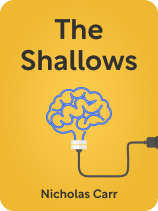

This article is an excerpt from the Shortform book guide to "The Shallows" by Nicholas Carr. Shortform has the world's best summaries and analyses of books you should be reading.
Like this article? Sign up for a free trial here.
How has the internet changed society? Are our values changing because of it? How are search engines and social media altering our access to knowledge?
The digital age has brought about significant changes in how we process information and interact with the world. From the way we consume content to the impact on our cognitive abilities, the internet’s influence is far-reaching and complex.
Keep reading to discover how the internet has changed our world and what it means for the future.
How the Internet Has Changed Society
How has the internet changed society? In The Shallows, Nicholas Carr contends that our reliance on the internet as our primary source of information is making sweeping societal changes. As with the advent of written language itself, the rapid growth of online media makes more information available to the public while redefining how that information is consumed. Carr describes how search engines control our access to information, leading to a skewed presentation of humanity’s knowledge. Furthermore, in our tech-driven era, there’s an increasing trend toward speed and efficiency which overlooks the fact that deep contemplation plays a critical role, both in how we learn and how we develop essential human traits like empathy and problem-solving.
(Shortform note: Carr stops short of attributing society’s increasing polarization to the internet—a common modern narrative—but while it’s easy to blame search engines and social media, the truth is often more nuanced. Online platforms use machine-learning algorithms to tailor content to users’ preferences, which can lead to the creation of echo chambers and confirmation bias, but it’s vital to remember that internet users also bear responsibility. Even without modern algorithms, the internet would likely contain self-reinforcing communities. The challenge lies in balancing personalized recommendations with diverse perspectives.)
The Commodification of Knowledge
The internet is often described as an “information superhighway,” but it’s the people and businesses building the roads who determine where that superhighway goes. Search engines, while seemingly useful tools for rapid access to information, also create an information bottleneck by controlling both the content and the speed at which we read. They encourage fast-paced information consumption while breaking knowledge down into chunks without context, promoting only the most popular viewpoints.
Carr states that the control search engines have over information translates into power for the companies who build them, and they use this power to impact the public’s access to knowledge. These companies capitalize on the links users click on, so the design strategy behind search engine algorithms encourages rapid and repeated clicking that takes the reader from one page to another as fast as possible. While on the surface this seems to provide more information, the downside is that this tactic undermines your ability to focus on information and retain it—an issue that’s irrelevant to the business models of search engine creators.
In addition to weakening readers’ focus and retention, the internet is also eroding meaning, warns Carr. The assumption underlying online content’s presentation is that all information can and should be dissolved into its constituent parts. Digitization turns books into databases where users can find specific ideas without engaging the whole text, thereby ignoring complexity and nuance. To an online information business, after all, books are only valuable as collections of data to mine. Additionally, search engines skew visibility toward popular viewpoints, making it hard for alternative perspectives to be seen or heard. Meanwhile, social media further contributes to breaking information into small, easily digestible nuggets.
The Stunting of Human Nature
Given how the internet is affecting both individual minds and how society shares information, what’s the direction in which we are heading? In the digital age, Carr says we’re drifting toward a mindset that values speed and efficiency over all. This approach downplays how important deep thought is to learning, creative thinking, abstraction, and fundamental human qualities such as compassion.
Carr suggests that our increasing dependence on technology is transforming how we think about thinking. The digital world favors efficiency and speed, with search engines designed to sift through vast amounts of data. This approach values finding information quickly while sidelining the importance of slow contemplation, a practice that’s crucial to learning and creativity. We’ve even started thinking of our brains as computers, which isn’t an accurate metaphor. While computers amplify speed and efficiency, human minds have a capacity for ambiguity and abstraction that, despite attempts to make machines that think like humans, computers have proven unable to duplicate.
(Shortform note: Not everyone sees the intrusion of technology into human thought as dangerous, as Carr does. In The Design of Everyday Things, Don Norman points out that while our relationship with technology continues to evolve, human needs remain largely the same. The key lies in using technology to do the jobs technology should do, freeing up time and effort for humans to do even bigger and better things than before. In the cognitive realm, pairing human intelligence with technological tools creates what’s known as distributed cognition, which Norman says can typically outperform what people or machines could do by themselves.)
Meanwhile, the internet is increasingly impacting how we socialize, work, and educate ourselves. Carr writes that as we adapt aspects of the human experience to suit a computerized world, we risk losing something vital in the process. Just as any tool enhances our abilities while also changing our skillset over time, our excessive dependence on computers may hamper our ability to solve problems on our own or to adapt our knowledge to novel situations that computers can’t predict. Moreover, when the internet undermines slow, contemplative thought, it reduces our capacity for compassion and empathy—feelings that require time to cultivate and can’t thrive amidst constant online distractions.
| The Internet, for Better or Worse Beyond the changes to our thinking skills that Carr warns about, the internet has massively transformed the way humans connect with each other. Today, people have fewer real-time interactions and rely more and more on their virtual bonds, which online platforms have turned into transactional experiences. The traditional dynamics of building and nourishing relationships have shifted, becoming more superficial as our connections are reduced to the instant gratification of a social media click. Nevertheless, many experts believe that the internet has a net positive impact on human life and will continue to do so. At its most basic, the internet enhances communication, collaboration, and global access to information. It’s improved many people’s quality of life by enabling economic progress and individual advancement. As connectivity and AI tools advance, the internet will play a pivotal role in people’s physical well-being by advancing medical research and providing increased access to quality healthcare. Looking even farther ahead, experts anticipate a future where people have greater autonomy and control of their data, with platforms emerging to more widely distribute the benefits of a data-driven society. |

———End of Preview———
Like what you just read? Read the rest of the world's best book summary and analysis of Nicholas Carr's "The Shallows" at Shortform.
Here's what you'll find in our full The Shallows summary:
- The ways internet use is literally reconfiguring our brains
- How information technologies reshape human behavior
- The sweeping societal consequences of these changes in human cognition






